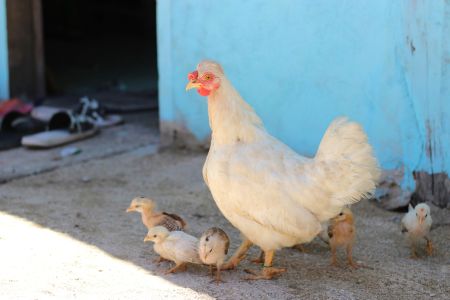I kind of like how our garbage/recycling/compost pickup companies refer to themselves not as “waste removal” businesses but as “waste management” businesses. It points to the fact that when we generate trash, it doesn’t magically disappear when it gets whisked away – it still needs to be dealt with appropriately. Although each week on garbage day, from my perspective, that magic does seem to happen, it’s really just that I’m no longer the one to who needs to “manage” the waste from that point on.

But some of the waste that I have to contend with can’t get heaved into a truck and become someone else’s problem. There are more intangible things I can waste: my time, other people’s time, my mental and emotional energy. And like generating physical trash/recycling/compost, even though we try to minimize our waste, there’s simply not a perfect waste-less way to be. Each of us has to deal with internal waste that we accumulate in the normal course of life as a human being.
One of the hardest of those intangibles for me to approach as my own “waste management professional” is wasted love. Maybe you can empathize with one or more of these scenarios:
The ride-or-die best friends from years ago that drifted apart and now haven’t spoken in a decade, because their approaches to life ended up diverging so very sharply. Wasted love.
The romantic relationship that they fought hard to keep, but that just wasn’t healthy and had to end. Wasted love.
That skill or role he used to be so proud of, but someone discouraged him deeply and he stopped; now he grieves that after leaving it behind, he’s neglected the skill for so long he’ll never regain it. Wasted love.
Years upon years of wholehearted service in churches – churches that now embrace theologies and policies that she can’t and won’t. Wasted love.
All different heartaches, but at their core, it’s the same pain. Something shifts or is revealed, and we find ourselves moving forward differently, leaving behind all that “potential love” that, in other circumstances, could have been. In this way, the feeling of “wasted love” isn’t just the sadness of looking back, but the sadness of looking ahead to a present and future that will never be.

To nudge that notion just a bit further, wasted love and wasted time are deeply connected melancholies, and it can be tricky to know what to ask for in prayer to cope. Every time I hear or sing Chris Tomlin’s song This is our God, I get a bit stuck on this line: “He will wipe away your tears, and return your wasted years.” How, God? How can wasted years – or wasted love – be returned? What does that look like? It’s a kind of an odd thing to promise.
I’ve learned that the verse that this line was taken from, Joel 2:25, gets expressed differently from one translation of the Bible to another. In some translations, God is promising to restore the years to his people, in some, God promises to repay them for the lost years, in others to replace the years. It seems like the problem of what to do with the pain of wasted time and love is not just tricky in the expression of asking, but in the expression of answering as well.
Some of those translations feel kind of like that “happy ending” of the story in the book of Job, which, to be honest, always was a bit ick to me. Job was healed from his illnesses, got way more camels/sheep/oxen than he had had before, and even got new kids that were better-looking than the old ones: the end! Acknowledging that the book of Job is an incredibly ancient morality play, replacement sheep and camels are one thing, but getting replacement upgraded family members just doesn’t land for 21st century me.
Another quite different passage in the Bible that comes to mind when I think of wasted love is Jesus’ heartbroken cry in Matthew 23:37: “Jerusalem, Jerusalem, you who kill the prophets and stone those sent to you, how often I have longed to gather your children together, as a hen gathers her chicks under her wings, and you were not willing.” That lament doesn’t come to us with a convenient pre-packaged solution – Jesus is just articulating the raw sadness of his unreciprocated love in the midst of being angry with his people. That lands for 21st century me.

Maybe I need to think more like Jesus, and not necessarily look for the Job-ending. Instead of thinking of wasted love as something needing to be replaced, I can reassess my assumption that that love was wasted at all – Jesus never says in that passage that his love for his people was wasted, after all.
Now this might seem a bit of a drastic cognitive shift from Job and Jesus, but bear with me here. I’m helped in some ways when I’m in this “ugh, it was all a waste” mindset by Ariana Grande’s breezy hit from 2019 called thank u, next.
In case you didn’t have tweens in your house in that era and aren’t familiar with the lyrics, she wrote about being appreciative of her past loves that hadn’t lasted, because in each one, she learned something important about herself and about what she valued in relationships. She reframed what we would often call “failed relationships” by looking at them with gratitude instead of regret or shame.
Here’s part of the chorus:
Say I’ve loved and I’ve lost
But that’s not what I see
So, look what I got
Look at what you taught me
And for that, I say
Thank you, next
In addition to the philosophical insights of Ariana Grande, I’ve been encouraged by some relevant quotes that have popped up on my social media feeds (thank u, algorithm).
The first one speaks to relational love: Love is never wasted, for its value does not rest in reciprocity. This is weighty stuff. On days that I agree with it, I find it an encouragement to continue taking a loving posture simply because that’s the right thing to do. Even on days that I disagree with it, it puts words to the idea for me to push back a bit on.
I also love this social media post by Louise Miller (@louisethebaker on “X”) – italics below highlighting the heart of it are mine.
“I’m almost 50, and here is the best thing I have learned so far: every strange thing you’ve ever been into, every failed hobby or forgotten instrument, everything you have ever learned will come back to you, will serve you when you need it. No love, however brief, is wasted.”
Although her post is talking about the skills and activities that we pour our love into, I think we can pull the insight into the realm of relational and other loves as well. When we put love of any flavor into the world, we’ve brightened the reflection of the image of God in the world. Like John said in his first epistle, “God is love. Whoever lives in love lives in God, and God in them.”
And so we can reframe. Maybe that love was just for a season. Or, maybe we decide to reconnect with a person or a past skill that we loved. Maybe it’s something that we release and grieve and say, “thank u, next”. Maybe we celebrate that we took a loving posture and spread our wings with openness, no matter if it was reciprocated.
And then the moment comes when we realize that it doesn’t feel like managing waste anymore.


18 Responses
Whew. Honestly, that’s a relief.
It’s so funny how the conclusion is “obviously no”, and yet I have to keep being reminded again and again that really and truly, the answer is still no! This summer had a “wasted love” season for me as I grieved (and am still grieving) the sudden and unfair loss of a community in my life, and I had to walk myself through the assurances that the love that I had spent so freely for a couple years wasn’t wasted.
It’s kind of telling that my original title was simply “Wasted Love”, which in its flat statement-tone indicates where my heart had been sitting. Thanks to Jeff for the gentle and more hopeful edit.
I used to tell the college students I taught, based on my own experience, that “God uses all your detours.”
I love that! We like to assume that the path forward will be straight and predictable, don’t we – even though we know when we look back down the path that brought us where we are, there are all sorts of detours that shape us.
What a deft and insightful—and helpful—piece. Thank you.
Thanks for the encouragement, Jon!
Thank you for this, although I have to admit I wasn’t with you until you got to the conclusion that no love, however profoundly or lightly shared, is wasted. I will never get anything tangible from the moments of a smile and a bit of conversation with the employee who is always there at the drive-through window at McDonalds. But, that brief encounter, which is necessitated quite often by my love of mocha frappe’s, connects us, letting her know that I see her as an image-bearer of God. We give thanks for her staycations, for no one berating her that day. Loving people, vocations, strengths, and failures shapes us and is never wasted.
Hmm, this makes me wonder about good things that maybe aren’t love, if that makes sense. Like, as you say, a kind but superficial interaction with someone. Is that love, or is that something else? Maybe anything, no matter how superficial, if it’s flavoured with the Fruit of the Spirit, is within the broader spectrum of love? Interesting thoughts.
It is tough to try and classify what passes as love. Does love have to be deeply felt by both participants? Does it have to be deep and abiding? How I love friends at church or in the community is vastly different from how I love my family yet I consider both to be, as you say, ‘flavoured with the Fruit of the Spirit’. It is God who calls us to love others as ourselves; although I’m not sure about the guy who cuts me off with his unsafe lane change.
Thanks Kathryn,
It’s not exactly perfect for what you wrote, but I always remember General Lowenhielm’s speech in Babette’s Feast:
“Mercy and truth have met together. Righteousness and bliss shall kiss one another. Man, in his weakness and shortsightedness believes he must make choices in this life. He trembles at the risks he takes. We do know fear. But no. Our choice is of no importance. There comes a time when our eyes are opened and we come to realize that mercy is infinite. We need only await it with confidence and receive it with gratitude. Mercy imposes no conditions. And lo! Everything we have chosen has been granted to us. And everything we rejected has also been granted. Yes, we even get back what we rejected. For mercy and truth have met together, and righteousness and bliss shall kiss one another.”
He’s quoting Psalm 85:10, and there’s something lovely about the mercy of God that wastes nothing, grants us everything (that is good), and invites us into gratitude for it all.
Once again, thanks, and wonderful introduction with the Waste Management illustration to get us to the heart of the matter. Love it!
The mercy of God wastes nothing and imposes no conditions – that really is a vast and lovely thought to treasure up in our hearts!
It’s this issue of wastefulness that always has made me dislike the phrase we use for the L in the “Calvinist” TULIP. To me, the phrase limited atonement makes it sound as if God is stingy and doesn’t want to waste even a speck of love or grace. I know there are other ways to understand the phrase, but I think “limited atonement” is a poor choice of wording. Perhaps in the end, nothing is truly wasted, but I think God is so overflowing with blessings that he doesn’t mind “wasting” them on those who don’t appreciate them. There’s nothing stingy about the Lord. Even if we don’t want to spill toxic waste in our relationships with others, we certainly can be more than generous with God’s grace.
I like this connection to the idea of God’s blessing. That’s something that comes to mind for me too – a few years ago I wrote a piece here on the mental models we construct of God’s “economy of blessing”, and how if we think of it as a scarcity model (“I got this blessing so there’s less in the pot for others”) we start to think not only of our relationship to God in an unhealthy way but our relationships to one another in unhealthy ways. https://reformedjournal.com/2022/10/18/lets-say-grace/
There are definitely links between the ideas of blessings/love being wasted and a mental model of scarcity! Thanks for this! Now you got me thinking about it all over again! 🙂
Yes, beware of the scarcity mindset. I get the feeling in your piece that you’re working from a quantitative or perhaps value added perspective, and I get it. We are steeped in a culture that seems to maximize every interaction and experience. As if there has to be some kind of return or identifiable redemption for everything we expend. But I think the incarnation makes the point that love is just love for its own sake. What if we thought of life and faith as just participating in and enjoying the Love that is God and let go of any thoughts of justifying or redeeming any of it? Thank you for your thoughtful writing about this.
This piece deeply resonated with me. The way it reframes wasted love as enriching and meaningful, drawing from both scripture and modern insights, was truly comforting and shifted my perspective on past relationships.
I’m so glad to read this. There’s a particular kind of “redeeming” that I think happens fully internally, when we’re able to look back to past events or relationships with that shifted perspective. Perhaps even a way in which God is at work outside of time!
So much wisdom here, Kathryn. Thank you. When I look at certain broken relationships in my life it’s difficult sometimes not to see it as wasted love, wasted time, etc. Your second-last paragraph really spoke to me – the idea of celebrating that we acted in love and openness regardless of the outcome.
Thanks for this, Jeannie! Sometimes that “reciprocity isn’t the point” is a tough idea to make friends with, but I agree – it really can be freeing and worth celebrating, maybe especially so when it’s a challenge to sift other joys out of the situation.